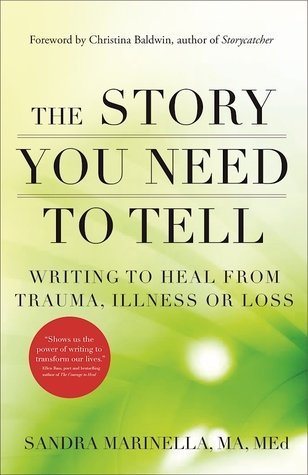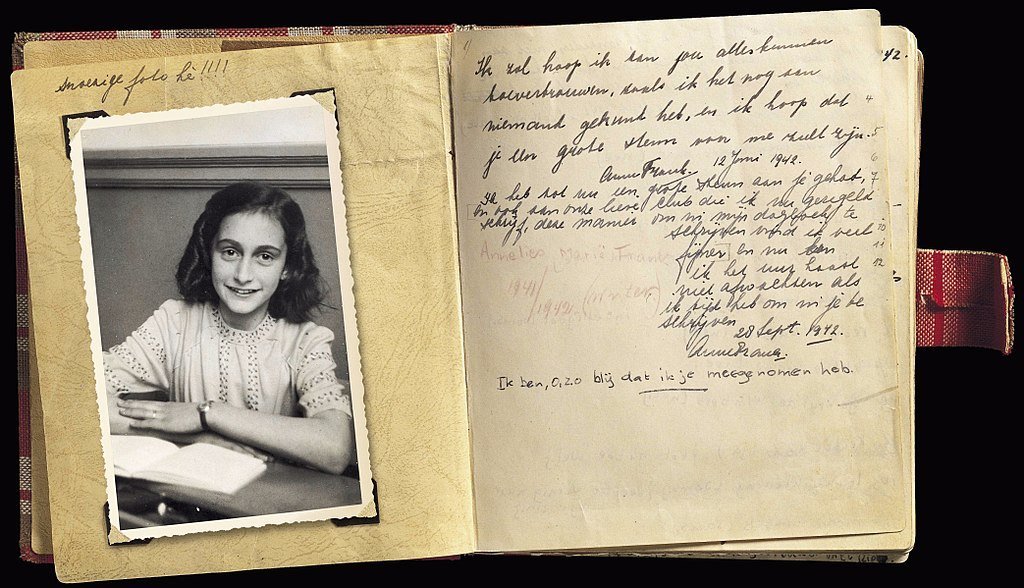How journaling provides mental, physical and emotional healing
“Keeping a journal of what’s going on in your life is a good way to help you distill what’s important and what’s not" - Martina Navratilova
When I started to research famous people who had made journal writing a regular habit, one thing took me by surprise. It turns out that this isn't some strange habit that a handful of obsessive, odd-balls have. It is a habit that seems to crop up repeatedly when you research the lives of successful people in all walks of life.
Whenever I thought of well-know journal writers I had a shortlist in my head of the usual suspects such as Anne Frank, Marcus Aurelius, Samuel Pepys, and my all-time favorite, Benjamin Franklin, but it turns out it doesn't end there. Far from it.

Famous Journal Writers
Here are just a few of the many famous names who are known to have a passion for keeping a journal. I'm sure you'll recognize most of them.
- Anais Nin
- W.H. Auden
- Madeleine L’Engle
- Virginia Woolf
- André Gide
- Henry David Thoreau
- Ralph Waldo Emerson
- Oscar Wilde
- Susan Sontag
- Eugène Delacroix
- Sylvia Plath
- David Sedaris
- Franz Kafka
- Robert Falcon Scott
- Courtney Love
- John Steinbeck
- George S Patton
- George Lucas
- Charles Darwin
- Ludwig van Beethoven
- Ernest Hemmingway
- Larry David
- John D. Rockefeller
- George C. Marshall
- Isaac Newton
- Frank Capra
- Pablo Picasso
- Peter Jennings
- Leonardo da Vinci
- Mark Twain
Why journal writing?
Why do tennis players, emperors, politicians, business leaders, military strategists, musicians, inventors, artists, philosophers, and leading scientists, make journal writing one of their regular habits?
It turns out that there isn't just one major life-changing benefit that journal writing brings those who practice it - there are a great many including:
- Health benefits
- Improvements in overall happiness
- Increased positivity
- Improved creativity
- Success
In my experience people are split into two camps.
- Recognize the life-changing benefits of journaling and indulge on a regular basis
- See journaling as a chore that just soaks up time for little benefit. If you relate more to the latter than the former, i.e. you’re not a natural journaler, then this article is most definitely worth reading. I totally get it, as I felt exactly the same.
Once you know the benefits of journal writing, it makes complete sense. In fact, once you truly understand all the benefits it seems crazy not to make it a regular habit.
Most people understand and recognize that exercise is good for them, and so they make a regular effort to make it a part of their life - even if it is just in a small way. For some people exercise is an hours' session in the gym followed by an aerobics class three times a week, and then a yoga class on two other days and a ten-mile hike on a weekends. For other people exercise consists of a gentle walk each day.
It is the same with journal writing. Some people write obsessively, just like some people exercise obsessively. However, for most people journal writing is something they have made part of their life, but it isn't something that consumes it. It is just a part - in the same way as brushing your teeth is part of your daily routine.
Once you get into the habit of writing on a regular basis, it can truly transform your life. It can help with your mental and physical health, improve your ability to cope with stress, help with problem solving, and it can even be an excellent aid to memory for a variety of reasons.
But it doesn't end there. Below I have listed ten of the major benefits of journal writing. There are many others, but for me these ten are the biggies.
Let's dive in.
Benefit #1 - Your journal is your life story
“A personal journal is an ideal environment in which to become. It is a perfect place for you to think, feel, discover, expand, remember, and dream.” - Brad Wilcox
If you write in your journal regularly, it becomes a detailed record of your life. Imagine if you could think back to your high school, college or university days and wonder, ‘What was her name?’ or ‘What did they call the teacher with the weird hair who walked with a bamboo cane?’ and immediately be able to put your finger on the answer.
Or have you ever wondered whether something happened in a particular year, was it 2003 or 2004? If you are a regular journaler, the chances are you’ll have a record of all this information at your fingertips.
It is easy to think that our life story is not as historically noteworthy as Anne Frank or as humorous as David Sedaris, but that is not what's important. It is your life, and as lives go that makes it pretty darned important.
How I discovered my Grandfather
I remember clearing out my Uncle's house several years ago. Hidden away under hundreds of old books was a dusty little scarlet folder. Inside this folder were dozens of yellowing sheets; all the moisture soaked out of them decades ago. On each sheet was beautiful handwriting, of a quality rarely seen these days, the ink slightly faded, but still perfectly legible.
I started to read. Tears rolling down my face.
It was my Grandfather's journal. I had never seen this document, and I had never met him, as he died over twenty years before I was born.
As I turned over the pages the writing turned from excitement for a life-changing adventure to a foreign land into complete despair.
Within days of arriving in mainland Europe he found himself caught in no-man's land, half-way between the British and German trenches. He described his rescue and arduous journey back to England to recuperate, only to return to the front again within a few short months.
When he was writing these words did it cross his mind that his grandchild would be reading these words a century later? Did he ever think that through these words he would create an everlasting connection with a grandchild who he never got to meet?

Benefit #2 - A journal can be an amazing release
“I can shake off everything as I write; my sorrows disappear, my courage is reborn.” - Anne Frank
A journal can be like your own personal therapist where you get a chance, whenever you get the urge, to get all of that tough stuff out of your head and down on paper.
It can be a hugely cathartic experience.
Unlike a therapist, you don’t have to lie down on a couch, or comfortable chair, and share your innermost thoughts with a complete stranger. You can do it all in the comfort of your own home, office, coffee shop, or wherever you choose.
Experts, scientists and top universities agree
There are thousands of research papers and articles that document the mental health benefits of journal writing and expressive writing. Top universities, health experts, and prestigious journals are writing and talking about the proven benefits of journaling and writing therapy in general.
The results are in, and they are very much in favor of journaling and writing therapy. This isn't a gray area that is open for debate.
In my personal experience, I found that the release that comes through regular journal writing comes in waves.
There can be an initial honeymoon period when you first start writing, when the benefits of having a safe place where you can process your inner-most thoughts, is clearly up-front and obvious. Then, as the practice becomes more of a habit, it can start to seem like those benefits taper off, which is probably true. By then you will likely have released a lot of deeply buried issues to some extent. But, as you progress with your writing new insights help process issues at a deeper level, like peeling layers of an onion, until eventually the issue has either become a non-issue, or its importance is so diminished that it is no longer center stage in your life.
For many people this ability to provide a release is definitely one of the major benefits of journal writing, and even though there are many amazing therapists around, it is nice to know that you have a tool at your disposal that can either act as an alternative, or can be there for you at those times when a therapist might not be immediately available.
Benefit #3 - Your perspective on things changes
“Journal writing gives us insights into who we are, who we were, and who we can become.” - Sandra Marinella
Once you get things out of your head and on to paper, they can look remarkably different.
Not only will journaling provide you with a potentially life-changing new perspective, but writing things down often makes things seem a lot less personal and intense.
Situations and problems that might appear unsurmountable when in your head slowly become far less intense and problematic, and even those happenings and events that have a major impact on your life can be easier to bear when you process the thoughts and get them down on paper or into your computer.
In The Story you Need to Tell Sandra Marinella describes how she used her passion for writing to mentally process her breast cancer diagnosis.
Her journal writing helped her to see the situation differently. It didn't take away the diagnosis itself, but it helped her to see the bigger picture so that she didn't drown in the diagnosis.

I would highly recommend Sandra Marinella's book for anyone going through a major health crisis, or any major life crisis such as the death of a loved one, a divorce, losing a job, etc.
The book helps you realize what an important role writing can play at such times, and it offers hope and positivity in such huge doses that it is pretty much impossible to get the end of the book without feeling completely different to how you felt when you started reading the first chapter.
Benefit #4 - Progress (or lack of) is visible
“Documenting little details of your everyday life becomes a celebration of who you are.” - Carolyn V. Hamilton
Keeping a journal regularly makes it very easy to look back and see how much progress you have made. Without a journal it's difficult to remember how different things were even a month ago let alone a year or a decade ago.
Be warned though, as this accountability can be a double-edged sword as any lack of progress will also be self-evident. Fortunately, I have found that this too will prove a positive benefit as your journal will help you see the areas in which you need to make improvements and those areas in which your progress is not all it could be.
Top sports personalities embrace journaling
Many successful sportsmen and women are avid journalers. On a day-to-day basis they will keep a detailed record of their training schedules, diets, etc. In addition to that they will add events attended, performance, areas in which they did well, and things that are open to improvement.
This diligence to record keeping, or writing in their journal, helps these sports people to see the big picture, and to create a plan to help them be more successful going forward.
The irony is, that it is often the most successful sports people who are the most avid journalers, with lesser successful ones just flying by the seat of their pants in the vein hope that things will magically click into place one day, and they will fly up the rankings. Whilst they are constantly having to course-correct, the successful ones are laser-focused on two things:

You don't need to be an athlete to benefit from the visibility of progress that journal writing brings. People in all walks of life can see major benefits that will propel them forward in their life, their relationships, their business, or whatever else life throws at them.
Benefit #5 Progress is almost guaranteed
“Journaling helps you to become a better version of yourself.” - Asad Meah
Take the time to write down what is going on each day, and you’ll be amazed at how you become focused on what happens. This focus results in things progressing in the direction you want them to progress.
Alison is a marketing director in a large advertising agency in Manhattan. Over the last few years she had started to suffer from a significant increase in stress and anxiety. In her search to find solutions she booked some sessions with a life coach.
Carrie, her life coach recommended that she start journaling on a daily basis. So, at the end of each day, before catching the A-train back to Brooklyn, Alison spent twenty minutes writing in her journal.
Daily writing gets to the heart of the problem
After a week of these twenty-minute sessions, Alison started to see a pattern. It became increasingly clear to her that the cause of almost all the stress she suffered from in her job was due to her inability to efficiently delegate work to her team.
Slowly she started to put the advice in the book into practice with her team, but it wasn't plain sailing. There were many challenges along the way. Each afternoon, before running to catch the train, she continued to journal. She'd write about the techniques she had tried to utilize and the successes and failures that she experienced.
Three months later one of the company's directors called a meeting. They had just acquired a new client who was about to launch a major new financial product. Alison hadn't been part of the pitching team in the acquisition of this client. She wondered why she had been asked to attend the meeting. The answer took her completely by surprise.
It turned out that this large new client was considering moving a substantial amount of the marketing budget to Alison's agency, and that this initial project was a test to see how well things went. It was a complex project that needed perfect execution from start to finish. The agency wanted to make maximize their chances of keeping this large account and so wanted to put one of their very best people in charge of it - and that person was Alison.
Needless to say, the product launch was a huge success and the client moved the lion's share of their business over to the agency, and every day, before she heads off to catch the A-train, you will find Alison typing into a secure document on her computer for twenty minutes - her journaling practice having now become a lifelong habit.
A highly effective system for achieving your goals
But it isn’t just what you are struggling with that expressive writing will help with. In Alison's case it played a major part in helping her dealing with her anxiety and stress, but hundreds of studies have demonstrated that simply writing out your goals makes them far more likely to come to fruition.

Writing about your aims and objectives daily is like rocket fuel when it comes to putting a check mark next to each of your goals, so if you have goals that you are keen to see come to fruition, get into the journaling habit like Alison did, and it is almost guaranteed that you will start to see concrete progress in the right direction.
At the end of each work day, as the open-plan office became quiet, she continued on her journey of self-discovery. Each time she became more aware of exactly where she was going wrong.
Prompted by her journaling discoveries she visited the nearby Barnes Noble on her way back from lunch one day and picked up a book called If You Want It Done Right, You Don't Have to Do It Yourself!: The Power of Effective Delegation by Donna M Genett.
This short book confirmed many of the conclusions she had come to during her journal writing sessions. Not only could she see herself in so many of the pages, but she could recognize that the advice given was just what she needed to improve her delegation skills, and in so doing reduce her stress and anxiety.
Benefit #6 Improves the clarity of your thinking, problem-solving skills and memory
"There are a thousand thoughts lying within a man that he does not know till he takes up the pen to write.” - William Makepeace Thackeray
The habit of writing things in a journal helps you to declutter your thinking, which helps your subconscious to work on finding original solutions to any challenges that you might face.
In addition, reflecting on your day, so you can record it in your journal, helps you to get into the habit of remembering what happened. Once you get into this habit, it is amazing how accurately you start to remember the key events of each day.
Without journaling, each twenty-four-hour period just passes by in a blur.
Taking the time to journal means that you end each day by putting that day’s happenings into perspective.

Benjamin Franklin who helped write the Constitution of the United States and Declaration of Independence was a huge proponent of keeping a journal. This was incredibly forward thinking of Franklin as he would not have had access to all the scientific proof that is available to us today regarding the many benefits of journal writing. Clearly Franklin made this discovery on his own, but then this is the guy who also invented the lightening rod, bifocal spectacles and, rumor has it, swimming fins or flippers.
Franklin was such a fan of writing in his journal that he made it a key part of his daily routine and as a result of that passion we are lucky today to have access to his superb autobiography. In my opinion, not only is this one of the best autobiographies ever published, but it is also an excellent example of how beneficial the writing habit can be.
Had Franklin had not religiously documented everything about his life this literary treasure would not have existed. It is thanks to Franklin that we have an eloquent, first person account of life at the time, as well as some of the key moments in the history of the United States of America.
Benefit #7 Journaling and expressive writing can improve self-knowledge
"Journaling organizes your thoughts; allows you to see things in a concrete way that otherwise you might not see.” - Kay Walkingstick
Journal writing is like doing an archeological dig for buried behavioral traits and personality characteristics which you may otherwise never have realized you had. Slowly, over time, you will discover patterns that result in ‘ah-ha’ moments aplenty.
Not only did Benjamin Franklin's prolific journal writing habit leave us with an amazing glimpse into life in the 18th century, but it also provided us with what I would consider to be one of the first genuine self-help books.
With his prolific writing and his penchant for pithy one-sentence statements, Franklin provided help and guidance to generations of young people.
Franklin's Words of Wisdom
It was Franklin who wrote memorable words of wisdom such as:
"A place for everything and everything in its place"
"A penny saved is a penny earned"
"There was never a good war or a bad peace"
"Tell me and I forget. Teach me and I remember. Involve me and I learn"
"Never leave that till tomorrow what you can do today"
Franklin's 13 Virtue System
For the majority of the 84 years he was alive he was passionate about self-improvement. In 1726, when he was just twenty years old, he created a system to develop his character in a positive way. This became known as the 13 Virtue System.
He described this 13 Virtue System in quite some detail in his autobiography.
In a nutshell it was a way for him to monitor his performance in regard to thirteen key virtues. Each day he diligently made a note in his journal of how well, or badly, he had performed the virtues.
I propos'd to myself for the sake of clearness, to use rather more names, with fewer ideas annex'd to each, than a few names with more ideas: and I included under thirteen names of virtues all that at that time occur'd to me as necessary or desirable, and annexed to each a short precept, which fully express'd the extent I gave to its meaning" - Benjamin Franklin
This 13 Virtue System captures the essence of regular writing beautifully. By making journaling a regular event we can become aware of how we react to life’s events and how we can change those reactions to benefit us over the long term.
Franklin found, as do all regular journalers, that when we closely monitor the happenings in our life, both large and small, we start to gain insights that allow us to better navigate the inevitable ups and downs.
Benefit #8 A wonderful gift to leave your children and grandchildren
“If you haven't been journaling through this, now is a good time to start. One day, you, and people who love and loved you, and people who will never know you, may want to look back to understand how you survived.” - Darnell Lamont Walker
Many people have more than one journal. Often the main one, and often the only journal that they keep, is for their innermost thoughts. This is likely to be so intimate that they would never dream of sharing it with anyone, not even their nearest and dearest.
However, you are not limited to a single journal. Many keen journalers will have a second journal in which they record for posterity the events of the day, both life-changing and mundane. This can be an amazing legacy to leave for future generations.

Anne Frank wrote The Diary of a Young Girl, later better known as The Diary of Anne Frank, in the two years her family were in hiding during Nazi occupation of the Netherlands. In 1944 the family were captured, and Anne Frank ended up in Bergen-Belsen, where she died of typhus in 1945. Fortunately, Mipe Gies discovered the diary, and gave it to Anne's father, Otto Frank.
Anne’s diary has been published in more than 60 languages and appears on many lists of the top books of the 20th century. It was also made into a movie, The Diary of Anne Frank (1959), with Millie Perkins playing the part of Anne Frank.
Had she not kept her diary we would not have this incredible insight into life during Nazi occupation. Your life may not be as traumatic or sad as Anne Frank’s, but that does not mean you don't have a story worth telling.
Anne Frank didn’t keep a journal in the hope of it becoming an international bestseller. She kept it as a simple record of the daily events in her life. By keeping a journal you too can provide your children, grandchildren, friends and family with an amazing insight into your life. Maybe it won't become a bestseller, or be transformed into a movie, but it can still be an amazing gift to future generations.
Benefit #9 Health benefits of journal writing
"Whether you’re keeping a journal or writing as a meditation, it’s the same thing. What’s important is you’re having a relationship with your mind." - Natalie Goldberg
For many people this can be right at the top of the list when it comes to the benefits of journal writing. Scientific research over the last three decades has proven that journaling and expressive writing can have major benefits on many health issues. It is probably one of the most positive things you can do, not just to get well, but to keep good health if you already have it.
Fascinating Study on Writing and Healing
A New Zealand study demonstrates the benefits of writing beautifully. It was conducted by Hayley Robinson and Associate Professor Elizabeth Broadbent of the University of Aukland’s Faculty of Medical and Health Sciences.
122 Aukland residents, ranging in age from 18 to 55, each received what is known as a punch biopsy hole to each of their inner upper arms. These punch holes were performed by a dermatologist and basically are just a small wound measuring 4 mm across.
The 122 participants were then split into four groups.
University of Aukland's Medical and Health Sciences Study
Those in the expressive writing groups, groups 1 and 2, had to write about their 'deepest thoughts and feelings about a traumatic, upsetting experience of your entire life'.
Those in groups 3 and 4, the control writing groups, were asked to write about their normal daily life.
After 10 days the participants in each group were measured. The results showed that 52 percent of the people who had written expressively before the biopsy (Group 1) were healed, while only 27 percent of people who wrote expressively after the biopsy had healed (Group 2).
The results were worse for the two control groups that wrote facts about their normal life without emotion, i.e. groups 3 and 4.
Only 15 percent in the control group writing before the biopsy (Group 3) had healed. And for those who wrote about the control topic after the biopsy (Group 4), only 23 percent had healed.
Hayley says the results suggest that expressive writing has its greatest effects when it occurs prior to an acute wound.
“This is because the writing initially makes you feel worse before you feel better,” she says.
“So ideally you have finished writing and are starting to feel better during the period when your wound is healing. The results are important because they suggest that when you write is important, not just what you write about."
“Future research needs to look at the effects of expressive writing on the healing of chronic wounds, when writing can only be done after the wound has occurred,” Dr Broadbent says.
Conclusion
"Journaling, I believe, is a practice that teaches us better than any other, the elusive art of solitude — how to be present with our own selves, bear witness to our experience, and fully inhabit our inner lives." - Maria Popova
That’s nine incredible benefits, but the list could go on and on as journaling really is an amazingly beneficial habit in so many ways, which is why it has been so popular throughout the centuries.
Benjamin Franklin made it the habit of a lifetime, as did General Patton, Churchill, Marie Curie, JD Rockefeller, Thomas Edison and Mark Twain, to name just a few famous journalers.
Keeping a journal is so beneficial, and comes with so many amazing benefits. It would be crazy not to at least give it a try.
The great news is that it is quick, easy and inexpensive to get going with journal writing. You don't need to make any major commitments, and certainly don't need to sign-up for a lifetime of writing. Just give it a go for a week or two and see how it goes. All it takes is ten minutes a day. What have you got to lose.
Happy writing!

